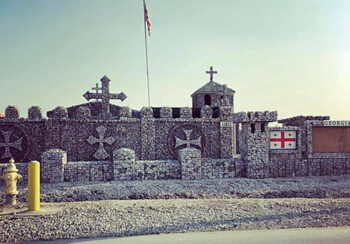By Diana Chandler —

Christian minorities in Afghanistan are either fleeing the country or hunkering down to live in greater secrecy as the Taliban government there draws support from the global community, International Christian Concern (ICC) told Baptist Press.
“There are Christians who say we can’t exist anymore in this country. We have to leave,” said William Stark, ICC regional manager for South Asia. “You have kind of this diaspora, if you will, of the Afghan church in a way. But then you also have people who are dedicated to staying, who feel that their calling is to stay in Afghanistan, regardless of the persecution they’ll face.
“They’ve kind of accepted the fact that God has a plan for them, in that God wants a church in Afghanistan and they want to be members of that church, regardless of the persecution that is likely to come forward and affect them.”
An estimated 8,000 to 10,000 Christians remain in Afghanistan, a country of about 38 million people that ranks second only to North Korea in its persecution of Christians, according to the 2021 World Watch List from persecution watchdog Open Doors.
“The ICC has definitely been in contact and is still in contact with Afghan Christians in the country,” Stark said. “There’s certainly a tremendous amount of fear and concern for their own personal safety and increased persecution under the Taliban rule. That obviously comes from direct persecution from the Taliban itself … but there’s also a fear of indirect persecution or persecution being increased from just sort of general fundamentalists in the country.”
Pakistan, Turkey and Qatar are urging global support and stabilization of the Taliban in its governmental role. In Pakistan, Senior level Pakistanis are supporting the Taliban in speeches, opinion articles and interviews, and through diplomacy with Western governments. In a speech to the U.N., Pakistan Prime Minister Imran Khan promoted strengthening and stabilizing the Taliban in Afghanistan “for the sake of the people of Afghanistan.”
Afghanistan’s economy is on the brink of near total collapse, ICC said. The U.S. and other members of the United Nations are sending humanitarian aid directly to the Afghan people, without recognizing Taliban rule.
Pakistan, Turkey and Qatar rank high as persecutors of Christians, sitting fifth, 25th and 29th, respectively, on the World Watch List of the 50 most egregious nations.
Matias Perttula, ICC director of advocacy, called efforts to strengthen the Taliban “a desperate attempt at legitimizing evil.”
“We are deeply concerned for the welfare of the Afghan people and especially Christians and religious minorities,” Pertulla said in a press release. “We hope and pray that their rights and liberties will be respected and honored going forward.”
To be recognized openly as a Christian was already risky before the U.S. withdrawal from the country, Stark said. Heightened persecution under Taliban rule will likely include the public executions, floggings and dismemberments that were common under previous Taliban rule.
“It likely will be worse under the Taliban,” he said, heightened not only by the Taliban’s strict version of Sharia law, but also by a community-wide sense of “collective honor and shame” that drives violence against Muslims who convert to Christianity.
Afghan Christians have avoided detection by blending in with Muslim communities and worshipers, praying to Jesus during daily prayers at mosques and operating house churches of as few as one or two families each.
The Christian community had become emboldened after the Taliban’s fall in 2001, with about 30 Afghan Christians including their religious affiliation on national identity cards before the Taliban regained control, The Hill reported Aug. 23. — Baptist Press




[…] acordo com a God Reports, a comunidade cristã havia se encorajado após a queda do Talibã em 2001, com cerca de 30 […]
Comments are closed.